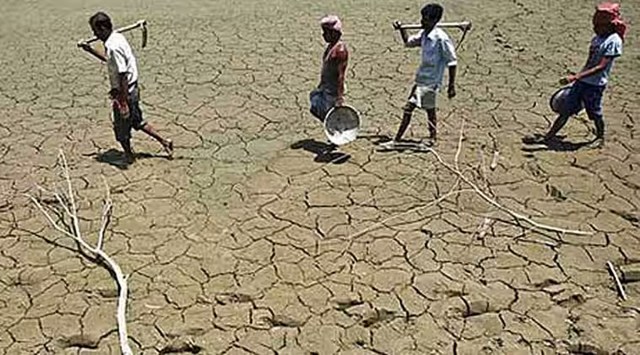Enforce Swaminathan Commission Report in letter and spirit to tackle agricultural crisis, farmer suicides: Vijay Jawandhia
Food production has increased but farmer income has not, says Vijay Jawandhia. The founder-member of Shetkari Sanghatana advocates generous government subsidies in the agricultural sector to tide over the crisis.
 Jawandhia, the founder-member of Shetkari Sanghatana, explains how the Swaminathan Commission Report is not only relevant but the need of the hour to tackle the agricultural crisis and farmer suicides in Vidarbha region of Maharashtra.
Jawandhia, the founder-member of Shetkari Sanghatana, explains how the Swaminathan Commission Report is not only relevant but the need of the hour to tackle the agricultural crisis and farmer suicides in Vidarbha region of Maharashtra.
In 2005, Vidarbha-based farmer leader Vijay Jawandhia had the opportunity to personally meet and interact with agriculture scientist Dr M S Swaminathan, the ‘father of Green Revolution, who passed away on September 28.
Chaired by Dr Swaminathan, the National Commission on Farmers (NCF) was formed in 2004 and submitted five reports between 2004 and 2006, suggesting ways to enhance the productivity, profitability, and sustainability of major farming systems in India.
In an interview with The Indian Express, Jawandhia, the founder-member of Shetkari Sanghatana, explains how the Swaminathan Commission Report is not only relevant but the need of the hour to tackle the agricultural crisis and farmer suicides in Vidarbha region of Maharashtra.
Q. How will last week’s intense rain/ floods in Vidarbha impact the agriculture sector?
Vijay Jawandhia: The torrential rains and flooding in Vidarbha will adversely impact soyabean and cotton crops. The yield will be much lower, badly affecting the overall production. The farmers have already lost soyabean. Due to climatic challenges, the growth of soyabean is stunted. There is some hope to recover in cotton, provided there is good sunshine in October.
Q. How will it affect cotton prices?
Jawandhia: As against last year’s Rs 12,000 per quintal, the price has come down to Rs 7,500. The international prices and domestic challenges have compounded the crisis for farmers. It will be further aggravated if the government fails to support the farmers.
Q. Despite agriculture policy reforms, why are farmer suicides happening in Vidarbha, Marathawada?
Jawandhia: There are inherent flaws in our agriculture policies. The Centre gives Rs 6,000 annually to individual farmers. What purpose has it served? With elections in Telangana, the Congress has announced it will provide Rs 15,000 per acre to farmers. Why is Congress not doing it in Rajasthan and Chhattisgarh, where it is in power? You talk of such financial incentives in Telangana because CM K Chandrashekhar Rao’s Bharat Rastra Samithi (BRS) is already emailing a similar scheme where farmers get Rs 10,000 per acre, which is non-refundable.
Q. What is the solution you have in mind?
Jawandhia: Why is the government not implementing the M S Swaminathan report in totality? Unfortunately, he just passed away. In 2005, Swaminathan visited Vidarbha. I had the opportunity to meet him and discuss the farm crisis in the Vidarbha region. The Swaminathan Commission Report submitted to the Centre recommended raising the MSP to at least 50 per cent above the weighted average cost of production. The C2 + 50 per cent formula includes the input cost of capital and the land rent to ensure farmers 50 per cent returns. Even after two decades, no government has recommended the Swaminathan Commission in letter and spirit in totality.
Q. But there have been several affirmative measures like enhancing the allocation of farm loans to small and marginal farmers within the financial institutional bracket…
Jawandhia: Swaminathan had emphatically stated that farm credit to farmers should be for a complete five-year cycle without interruption.
Simply put, if a farmer gets a Rs 1 lakh loan, he deposits Rs 80,000 and defaults Rs 20,000, he is no longer entitled to a fresh loan. As a result, he is forced to look for alternatives in private money lenders who charge higher interest rates. Farmers become debt-ridden and thrown out of institutional credit mechanisms within a year.
But as Swaminathan recommended, if the institutional credit to farmers continues for five years without interruption despite default, it will help them to become self-reliant. They will not be forced to seek help from private money lenders or exploited and pushed into debt. In the majority of farm suicides, the farmers are debt-ridden.
Q. What about the Centre and state’s double production, double income agriculture policy?
Jawandhia: Prof Swaminathan often used to say double production without double income will not help farmers. He was the pioneer of the Green Revolution. He emphasised higher yield per acre scientifically. Along with double production, he believed it should enhance farmers’ livelihoods financially and socially. While food production may have increased, farmer income has not. The investment in agriculture has substantially risen manifold. But the profit is much lower.
Almost six decades ago, farm wage was Rs 80/90 and teacher salary was Rs 100. The price of gold was Rs 200 to 250 per ten grams. While farm wages are now Rs 250, teacher salary is a minimum of Rs 25,000 and gold price is Rs 60,000 per 10 grams. So, farm wages have remained the lowest.
Q. How will it impact the rural economy?
Jawandhia: It is in the doldrums. With the agricultural crisis, the generation next is reluctant to take farming. The uncertainty and crisis have forced families to look for other options to make a living. Another social issue related is youths engaged in farming finding difficulty in getting a bride. Unfortunately, all our policies and reforms clearly are urban-biased. They don’t consider the real and larger challenges in the rural economy.
Q. Any measures that you propose…
Jawandhia: The only solution to these complications is generous government subsidies in the agricultural sector. Even a developed country like the United States provides massive subsidies in the agriculture sector. A sizeable component of their funds is towards not only making farmers self-reliant but also ensuring decent profits. There is no alternative to subsidy in the agriculture sector. If cotton farmers in the US survive despite a rate drop, it is because of government subsidies. The Centre and state governments can make adequate budgetary provisions for cotton farmers. It is not impossible.
Q. How should small and marginal farmers cope when crops fail?
Jawandhia: Small and marginal farmers are worst affected when crops fail, and returns are negligible. They desperately look for work. The national rural employment guarantee scheme is ideal to accommodate these segments. The government should not only bring agriculture activities within Mahatma Gandhi National Rural Employment Guarantee Scheme (MGNREGS) but also increase the daily wages. It will provide stability to farmers and also help them cope financially.












